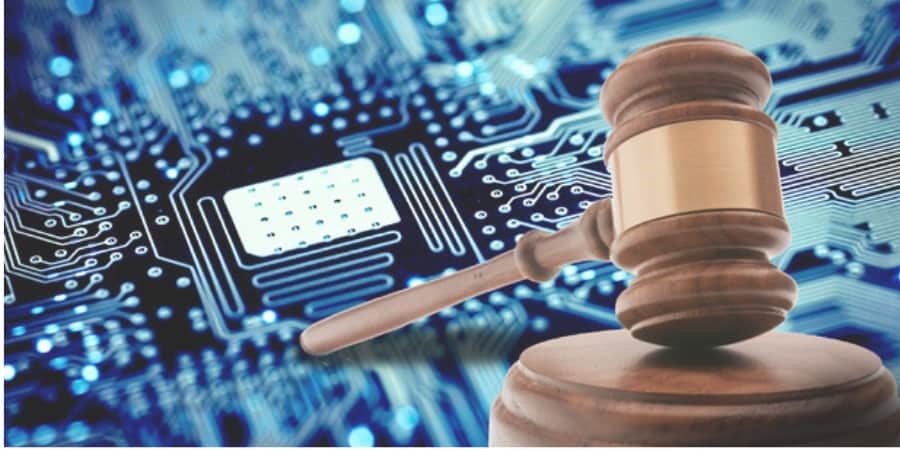The future of law is technologically driven

10 Jul 2020
The tale of the human lawyer
“Lawyers Beware – A Robot will take your job”. Andre, a human lawyer takes a deep breath as he reads through the article which ultimately signals the end of his kind – in the very near future. His face reflecting in the screen of his laptop, he realizes that meant him. A self-proclaimed contract specialist and something he had always prided himself on. Words and manners maketh man. At least he always believed. He decides to make himself a cup of tea. After all, everything can be fixed by a good cup of tea and spell check. In his experience.
With renewed vigor he stirs his adequately warm cup of earl grey tea and starts to reminisce on his lengthy legal career. Years of studying at university. Achieving top results. Working as an article clerk (the worst two years of his life) and thereafter earning his way through the ranks of renowned law firms. Ultimately deciding to move into a corporate environment, leading the legal department. He had achieved a great deal. Seen his fair share of contracts. Had drafted more than his fair share of contracts. Had spent hours working well past midnight in order to get a contract finalised. A robot, programme, software or AI could not replace that. Could it?
It is at this moment that he realizes (with a sigh of relief) that he had, through the years, developed a huge repository of data and information. Where absolutely every contract that has ever been drafted has been stored (a slight exaggeration). There was nothing he had not seen (including mistakes and grammatical errors). He was willing to wager (almost) that there was nothing he had not yet drafted (even if it was not from scratch). A computer programme could not replace him. No, he concludes, whilst silently acknowledging that version control was always an issue, that getting contracts signed was always a hassle and that the storing of contracts was becoming a problem.
Ok there were issues. He had to admit. But what to do about them?
The Covid catalyst
It is now an obvious statement – the Covid-19 Pandemic has gripped the world. Face masks, continuous sanitizing of hands, social distancing and fear of spreading the virus have become the new norms. Another accepted statement is that the effects of lockdown and the economic backdraft caused thereafter will be felt for months, maybe years to come. Worldwide. And companies are starting to wake up to the fact that things need to change. And quickly.
The phrase “disruptive innovation” has been thrown around quite a bit. According to the Harvard Business Review, as far back as in their December 2015 issue,
“The theory of disruptive innovation, has proved to be a powerful way of thinking about innovation-driven growth. Many leaders of small, entrepreneurial companies praise it as their guiding star.”
The paper goes on to say that the “theory’s core concepts have been widely misunderstood and its basic tenets frequently misapplied” with many people using “disruptive innovation” as a way to justify whatever it is they are trying to achieve by describing any situation in which an industry is shaken up and previously successful incumbents stumble, to innovate in order to grow. A kind of sink or swim mentality.
Be that as it may. No one can argue that the Covid-19 Pandemic has been a major disruption to businesses across the globe. Forcing them to not only institute remote working models, something that is unlikely to change in the foreseeable future, but to also expedite their previous plans to innovate and become more efficient as quickly as possible. Plans to move documents to the Cloud and automating document processes are starting to happen with rapidly growing enthusiasm. The very definition of disruptive innovation.
In an article titled Covid-19 a catalyst for innovation and entrepreneurship, one such opinion is expressed as follows –
“Essentially, organisations will have to find new ways to do old things, except in quicker and better ways to deliver on customer expectations, in a cost-effective manner. One of the key things that companies need to be focusing on is how to empower employees to deliver more and better, and manage and monitor their output, rather than focus on input.”
Agreed.
Consider this (probably) familiar scene – a managing partner opens a meeting by stating that the Covid-19 Pandemic has caused many unforeseen impacts on business. One of which, is the company’s contractual obligations. The existence (or not) of the contracts themselves. The managing partner reads an extract from a paper by Deloitte on managing contractual relationships during business interruption –
“a diligent review of existing contracts may be necessary to minimize loss, protect the business and ensure continuity”.
Andre, at that stage, realizes that all contracts would probably need to be re-evaluated. Possibly redrafted. A huge undertaking which would result in the legal team having to review contractual relationships with all their partners. The firm would also need to understand what the ramifications are for business interruption going forward. What would they start with first? The managing partner looks squarely at Andre.
There has already been pressure on the legal department to innovate. To become more efficient. To speed up business dealings instead of holding them back. Was this the time for that (inevitable) change?
Progression for progression’s sake
In an article titled “The Importance of Adopting Technology in the Modern Law Firm”, Robin Gerhold on behalf of LexisNexis South Africa said the following –
“The legal profession is known to be notoriously slow to adopt technology. Even the most useful innovations are often only adopted in reaction to client demands for more efficient and cost-effective services.”
Again, agreed.
However, the lockdown and the continued strain on the economy are forcing businesses to innovate and to do so under massive time constraints. Not something the legal profession is very adept at doing. In an age-old profession which prides itself on regulation and institution, there has never been a need to be forward thinking. Or to adapt to progressive technologies. The slow cogs of the legal wheel have continued to turn for decades – without the need for change. Business requires legal input and legal practitioners can continue operating according to the status quo. The fourth Industrial Revolution be damned.
But is that still true? According to Elon Musk “Some people don’t like change, but you need to embrace change if the alternative is disaster.” Whilst the legal profession is unlikely to ever become obsolete, it does need to continue servicing technologically advanced businesses and therefore prevent a disaster – for example becoming obsolete. Understanding technology is key to promoting an innovative mindset and lawyers need to be able to deliver innovative products and services to clients that are efficient and cost-effective. Especially now.
Therefore, it stands to reason that the application of technological tools will assist legal practitioners to better understand and enhance the delivery of their legal expertise in the most efficient way.
This is not progression just for progression’s sake. But for survival. Which, as we all know comes down to the fittest (and those properly armed with the correct tools to enable adaptation).
Document automation – a step towards innovation
In an article titled “Artificial Intelligence & Automation Impact on Legal Jobs” it has been stated that augmented intelligence is not intended to replace the legal practitioner but rather that –
“Ultimately, augmented intelligence frees up legal professionals to focus on higher cognition tasks, while automating discrete repeatable tasks. Multiple tools are bringing augmented intelligence to legal practitioners.”
Step in the role of document automation
Whilst augmented intelligence may be a little technical for this discussion, automation of documents is not. It is readily available software which enables legal professionals to quickly identify information from current and legacy contracts to ensure that key contractual language and commitments are not missed, ultimately allowing attorneys to focus on the practice of law as opposed to only managing document versions and undertaking spell checks (like Andre). Eventually, legal practitioners will be called upon to only interpret rare ambiguities, likely caused by a human-generated fault that would never have existed had a document automation programme been used in the first place.
One such document automation company is XpressDox. A South African owned company proven as the industry-leader in document automation. Priding themselves on their servers and software which are designed for fast and easy deployment, the software can be efficiently customized to each company’s unique requirements enabling integration of documents at lightning quick speed. Their software allows for fast merging of large templates, resulting in users getting through more work. Quicker. Two key elements in order to prosper in our future economy.
The benefits of deploying the XpressDox suite of applications is that drafting time would be significantly reduced by using the document automation and creation tool, enabling a first draft of a complex transactional document to be circulated in less than an hour. By also limiting human error and reducing the risk of mistakes, which as every human lawyer knows, can haunt your contract life cycle years into the future, drafting reliably consistent contracts becomes a cinch.
What is clear is that technology, especially in the form of document automation, is fast changing the practice of law. Rather than the mundane and tedious practices of the current legal model, lawyers of the (very near) future must be able to focus on the substantive and intellectually engaging aspects of law. Advise their clients effectively and without time delay. It seems the fourth industrial revolution is coming to the profession, at an expedited rate (due to covid-19 or not) and this is most definitely a sink or swim situation. If Andre adapts, revolutionises his technology and automates his documentation, he need not fear his managing partner requesting assessment and possible redrafting of all company contracts. With the proper tools, this will be a walk in the park.
See also:
- Legal accounting and practice management
- Shifting the “needle” in the entrepreneurial struggle with SchoemanLaw Inc
- Letting go of the gobbledygook – Using plain language in legal documents
- Technology and continuing legal education
- New law paves the way for a new legal profession




